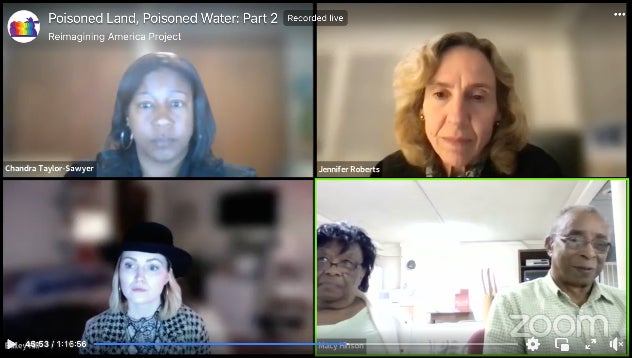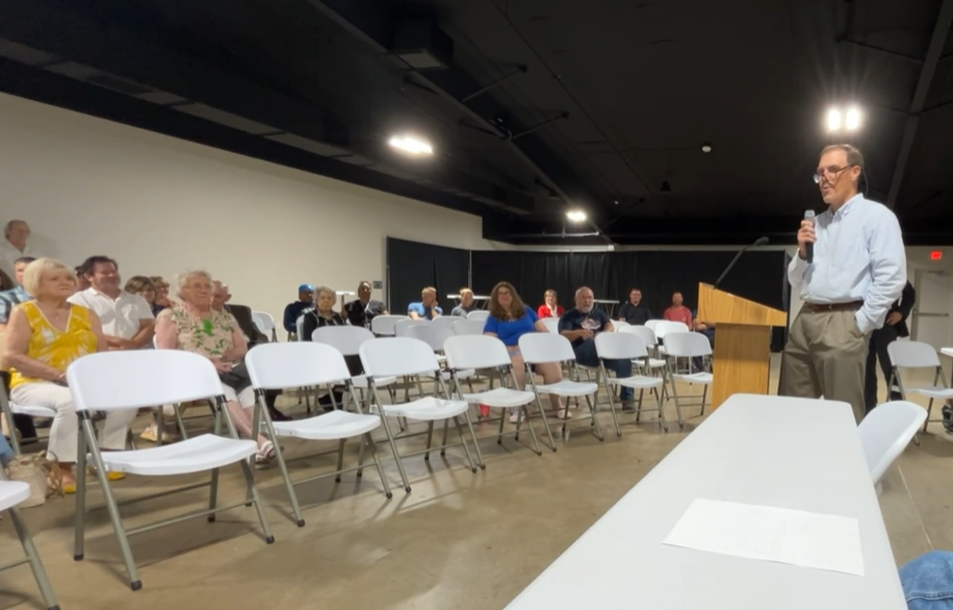Former Alcoa workers continue to raise concerns about buried hazardous waste
Published 3:58 pm Wednesday, March 22, 2023

- Here is a screenshot of the public forum held Monday night about Alcoa's continued pollution.
|
Getting your Trinity Audio player ready...
|
Workers at Alcoa in Badin achieved a milestone whenever they became part of the “25-year Club.” They received a week off and a check, according to West Badin resident Valerie Tyson, an Alcoa employee for many years.
But unknowingly, these employees, many of them Black, were also possibly being poisoned, as they were in constant contact with hazardous wastes, including cyanide, fluoride, polycyclic aromatic hydrocarbons (PAHs) and polychlorinated biphenyls (PCBs), that were buried in the ground for decades without regulation.
The waste, known as spent potliner, a byproduct of aluminum smelting, was dumped throughout the area, and is now leeching into nearby bodies of water including Badin Lake. Two of the three dump sites that contain the most buried spent potliner are in and around West Badin, the predominantly Black community where many of the workers lived.
Trending
Too often, the same people who were rewarded for their longevity to the company developed health issues including cancer and asbestosis, a chronic lung disease caused by inhaling asbestos fibers. Many of them died.
“You will see those same men that made that 25-year club being buried,” Tyson said during the second part of “Poisoned Land, Poisoned Water: A Legacy of Environmental Injustice and Racism in a North Carolina Company Town,” a virtual forum held Monday evening and hosted by Reimagining America Project, a local organization that uses testimony, witnessing and atonement to combat systemic racism.
The first forum, conducted March 9, addressed the history of Alcoa in Badin, specifics regarding the contaminants flowing into Badin Lake and recommended changes to Alcoa’s National Pollutant Discharge Elimination System (NPDES) stormwater permit, which expired in October.
Tyson noted the employees who worked at the site, including her father, never wore masks nor any other form of protective clothing as they continued to be exposed to the contaminated soil. Whenever concerns were brought to Alcoa, the employees were told there was no hazardous waste, Tyson said, and the health disparities workers encountered were not related to the buried waste.
“Men have died, sons have died, grandchildren have died,” she said. “These are the people that broke the records for Alcoa and never deserved to have died like that.”
Macy Hinson, who has lived in West Badin his whole life and worked for Alcoa for more than three decades, said even though Alcoa put mounds of dirt on top of the buried waste, that never eliminated the problem.
Trending
Hinson advocated for Alcoa to excavate all of the hazardous waste. He wants the area to be listed as a Superfund site, which are highly contaminated sites managed by the Environmental Protection Agency.
Alcoa has so far managed its own cleanup under a framework established by the federal Resource Conservation and Recovery Act, administered by the North Carolina Department of Environmental Quality (DEQ).
While it is expensive to clean up a Superfund site — he estimated it would cost at least $240 million — Hinson said Alcoa “has the funds and the means of doing so.”
“Please put the old trash dump back on the Superfund site and go in and clean it up the correct way,” Hinson said.
Hinson and Tyson are members of Concerned Citizens of West Badin, which was founded in 2013. In 2019, the Southern Environmental Law Center (SELC) successfully negotiated a settlement on the citizens’ behalf, requiring Alcoa to install a new stormwater system to manage the pollutants, specifically fluoride and cyanide.
If Alcoa was being addressed as a Superfund site, it would allow for more people to weigh in on the cleanup process, said Chandra Taylor-Sawyer, a senior lawyer for the SELC who has represented Concerned Citizens of West Badin.
“There’s a lot of hazardous waste that remains in West Badin,” Taylor-Sawyer said, noting Alcoa and DEQ need to be more proactive in addressing the problem as soon as possible.
In a draft environmental justice report released by DEQ in October, the department found “no evidence of environmental injustice” in Badin, according to Bailey Hill, environmental justice advocate with the Yadkin Riverkeeper.
However, in the analysis, Hill said DEQ relied on census tract data instead of more-specific census block data, which can show a “more accurate spatial representation of who lives in this neighborhood (especially people of color)…all of those demographics that really matter when you’re trying to evaluate the environmental harm on a community.”
DEQ also analyzed a one-mile radius of the area from the Alcoa site, though it did not account for “the concentration of hazardous waste buried throughout Badin,” Hill said, nor the “cumulative impact of environmental hazards on the Black residents of West Badin.”
During a question-and-answer session facilitated by Reimagining America Project co-founder and former Charlotte mayor Jennifer Roberts, it was asked why a class action lawsuit has not been brought up against Alcoa.
Taylor-Sawyer suggested the likely reason is because it is hard to definitively prove that an array of negative health effects are directly tied to the company.
Whenever workers raise concerns from their time at Alcoa, they are often seen as “trouble makers and liars,” former Alcoa employee Richard Leak said.
With only a few former Alcoa employees still living and voicing their concerns, according to Hinson, he said he feels like Alcoa is “waiting for all of us to be nonexistent or pass away” so then the issue will go away.
Hinson, who is in his 70s, is optimistic that a new generation will continue to fight for Alcoa to clean up the waste sites.
“I hope somewhere there is somebody in the West Badin community who will pick up the torch and continue to carry on what we’re doing or what we’re trying to do,” Hinson said.
For now, even though the Concerned Citizens of West Badin have dwindled in numbers over the years, Tyson, Hinson and Leak plan to continue speaking out.
“I’m going to keep talking until I cannot for those people who cannot talk,” Tyson said.
The SNAP has reached out to Alcoa for a response to the two forums.







